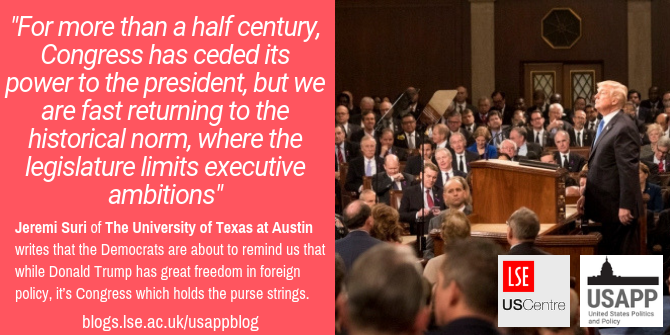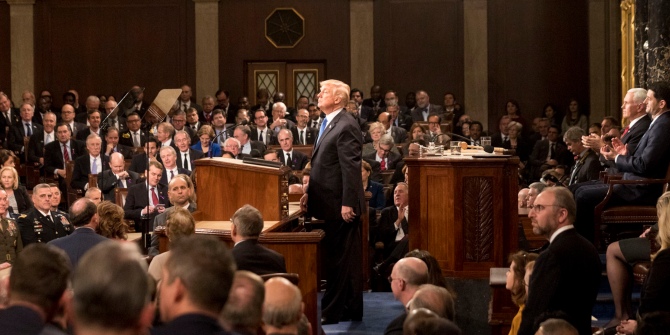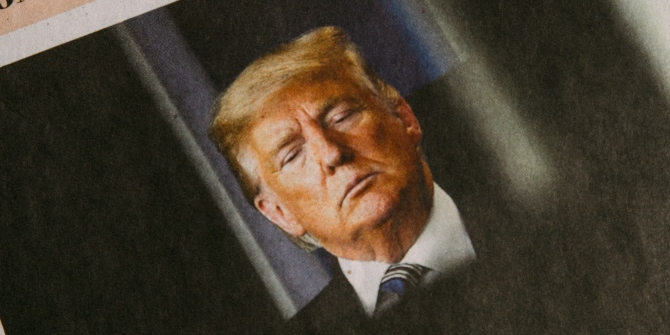 One of the main prerogatives of the presidency compared to Congress is its freedom in foreign policy: to make treaties, negotiate agreements and to deploy troops. But while Congress cannot set foreign policy, writes Jeremi Suri, it can influence it through the power of its purse. He argues that from now until at least 2020, we should expect push back from Congressional Democrats on President Trump’s nationalistic rhetoric as well as on his trade and military agendas.
One of the main prerogatives of the presidency compared to Congress is its freedom in foreign policy: to make treaties, negotiate agreements and to deploy troops. But while Congress cannot set foreign policy, writes Jeremi Suri, it can influence it through the power of its purse. He argues that from now until at least 2020, we should expect push back from Congressional Democrats on President Trump’s nationalistic rhetoric as well as on his trade and military agendas.
- This article is part of our ‘Making Sense of the Midterms’ series curated by Rob Ledger (Schiller University) and Peter Finn (Kingston University) and published in tandem with the LSE US Centre’s public event on that theme on 7 November 2018
American presidents have enormous freedom in foreign policy. They can send soldiers and weapons to all corners of the globe, and various domestic border locations, without congressional approval. They can negotiate agreements related to nuclear weapons, military bases, and foreign aid that remain partially secret. And they can frame public understanding of threats from diverse sources – including terrorists, rival states, and migrant “caravans.”
In the first two years of his presidency, Donald Trump has exploited all of these presidential prerogatives. He deployed soldiers from Afghanistan to the Mexican border. He concluded a unilateral agreement with North Korea while he personally tore up a multinational deal with Iran. Trump has relentlessly denigrated alliances, free trade, international institutions, and especially immigrants. He has acted as a solo wrecking machine against the long-standing liberal international order, and he has landed many blows. The Saudi assassination of journalist Jamal Khashoggi, with minimal reaction from the White House, illustrates how Trump has changed the rules. The Saudi leadership never would have approved this brazen attack, in a NATO country, with a previous president in the White House.
The election on November 6 of a Democratic House of Representatives, with a strong Democratic majority, does not eliminate any of these presidential prerogatives, but it diminishes their enduring impact. It also offers critics of Donald Trump – within the US and abroad – a powerful beachhead to push back. The president’s aggressive and defiant actions will have less weight, less muscle, and especially less money behind them. That will become evident very quickly.
Congress does not set American foreign policy, but it provides presidents with all of their tools. The House of Representatives is the place where appropriations must begin; the president cannot spend a penny without its approval. Committees in the House of Representatives have the power to call hearings, elicit testimony from government officials, and investigate controversial policies and suspected wrong-doing. The Republican congressional leadership during Barack Obama’s presidency also set a precedent for the House of Representatives to invite foreign leaders to address their chambers, without White House approval.
When confronted with challenges to his authority, Donald Trump almost always digs in and acts with ever-greater defiance. He disparages established institutions and practices, he attacks his opponents, and he brazenly lies. He has already reacted to the Democratic victory in the House of Representatives by doubling-down on his criticisms of European allies, immigrant activists, and especially the press. He has reiterated his militaristic defenses of nationalism, unilateralism, and “America First.” We should expect more of the same from the president and his spokespeople in coming months.

“State of the Union” by The White House is Public Domain.
Although the Democratic House of Representatives cannot muzzle the president, short of impeachment and Senate conviction, this powerful branch of government can neutralize many of the president’s audacious claims. It will do that, almost immediately. This process will begin with the new trade agreement, the US-Mexico-Canada Agreement or USMCA, that the president hastily negotiated with Mexico and Canada to replace NAFTA.
Tilted strongly to business interests, with minimal protections for labor and the environment, the new agreement will come before the Democratic House of Representatives in early 2019 to approve new appropriations. Democratic leaders have already indicated that they will demand major additions and revisions. They will give voice to labor and environmental concerns. They will include provisions for migrant workers, students, and “dreamers” (children of immigrant workers brought to the United States.) They will even allow Mexican and Canadian leaders to share their perspectives with members of Congress, citizens, and the press.
On trade matters, in general, Congress has legislative authority to negate White House-imposed tariffs. It can also de-fund subsidies promised to friends of the president. And most important, Congress can give voice to the harms inflicted on farmers, manufacturers, and consumers by Trump’s reckless trade war with China and other countries. His control over international flows of goods and capital is severely limited once the Democratic House of Representatives steps in, as it surely will.
The same can be said for military affairs, in general. Although the president can deploy troops at will, the House of Representatives must approve all expenditures within the annual budget, and during crisis situations. Democrats are unlikely to support further increases in military expenditures, and they will threaten to cut funding if the president does not meet certain conditions, including continued support for NATO and other allies, and the removal of the unnecessary military forces sent to the Mexican border, largely for political reasons. The Democratic House of Representatives will also make military budgets conditional on funding a more active and vibrant State Department, with qualified diplomats representing the United States abroad.
Animosity around these and other foreign policy issues will grow between the president and the House of Representatives. In the end, President Trump will have fewer opportunities to follow-up on his belligerent unilateralist rhetoric, and foreign actors will spend less time listening to his words. As was true before the Second World War, observers will recognize that while American presidents have enormous freedom in foreign policy, Congress still has much of the power. For more than a half century, Congress has ceded its power to the president, but we are fast returning to the historical norm, where the legislature limits executive ambitions.
Please read our comments policy before commenting.
Note: This article gives the views of the author, and not the position of USAPP – American Politics and Policy, nor the London School of Economics.
Shortened URL for this post: http://bit.ly/2K6GNtg
About the author
 Jeremi Suri – The University of Texas at Austin
Jeremi Suri – The University of Texas at Austin
Jeremi Suri holds the Mack Brown Distinguished Chair for Leadership in Global Affairs at The University of Texas at Austin. He is a professor in the university’s Department of History and the LBJ School of Public Affairs. Professor Suri is the author and editor of nine books on contemporary politics and foreign policy. His most recent book is “The Impossible Presidency: The Rise and Fall of America’s Highest Office.” Professor Suri teaches courses on strategy and decision-making, leadership, globalization, international relations and modern history.





